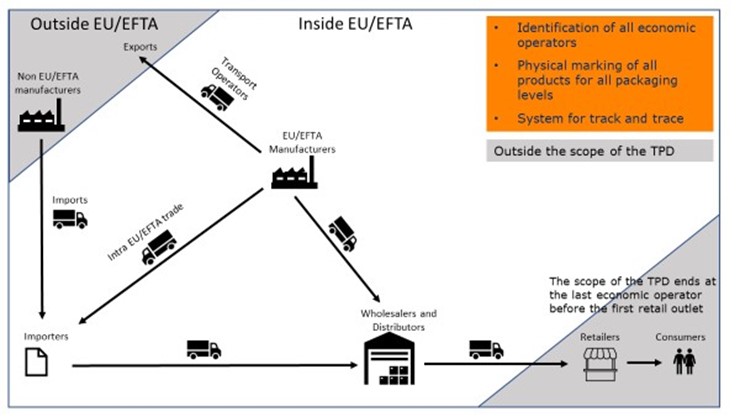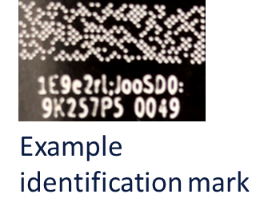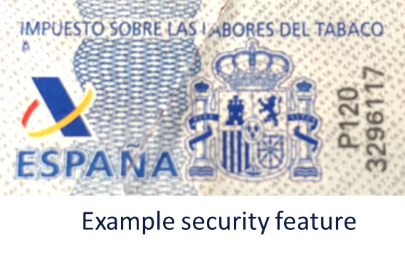(Last changed February 17, 2022)
Implementation of the Tobacco Directive in Norwegian retail sector
What is the Tobacco Directive?
The Tobacco Directive is an EU regulation, based on the WHO Framework Convention on Tobacco Control. The protocol entered into force on 25 September 2018. Both the EU and Norway have committed themselves to following this protocol.
The protocol stipulates that the parties shall provide a licensing, labeling and tracking system for tobacco products and associated economic activity in connection with the production and transport of tobacco products and production equipment. This is often referred to as the Tobacco Directive.
The directive will be implemented through 3 regulations:
EU 2018/574 Implementing Regulation: Technical standards for the establishment and operation of a tracking system for tobacco products.
EU 2018/573 Commission Delegated Regulation: Key elements in data storage agreements that are to be included as part of a tracking system for tobacco products.
EU 2018/576 Commission Implementing Decision: Technical standards for safety features applied to tobacco products.
Which products are covered by the Tobacco Directive, and when will this enter into force in Norway?
The Tobacco Directive covers all tobacco and tobacco-related products, as well as equipment for their production.
For EU members, the tracking system for cigarettes and roll-your-own tobacco came into force on 20 May 2019. For other tobacco products, 20 May 2024 applies.
The Tobacco Directive was incorporated into the EEA Agreement on 4 February 2022. For Norway (and other EFTA countries), the implementation deadlines follow transitional provisions laid down by the EEA Committee. As of 4 February, implementation deadlines have not been decided.
The Commission Delegated Regulation came into force on 1 November 2020 in Norway.
What is the Implementing Regulation?
The Implementing Regulation describes technical standards for how the tracking system should make it possible to track the entire journey the product has been on, from production until the tobacco product is ready for sale to the consumer.

Unique identification code for all players
All players that are part of the supply chain must have a unique identification code. This also applies to facilities where tobacco products are produced, stored or put on the market, such as production premises and machines, warehouses, terminals, vending machines, etc.
Unique identification mark on all products at all packaging levels
 The identification code shall be included in a unique identification mark affixed to individual packages and / or packaging containing more than one individual package of tobacco products (aggregated units). The mark shall make it possible to determine the date and place of production, as well as the route to be used from the production stage to the retailer.
The identification code shall be included in a unique identification mark affixed to individual packages and / or packaging containing more than one individual package of tobacco products (aggregated units). The mark shall make it possible to determine the date and place of production, as well as the route to be used from the production stage to the retailer.
An item cannot be legally traded unless it bears a unique identification mark.
Registration and reporting of tracking information
The Implementing Regulation imposes on market participants a responsibility for the registration and reporting of tracking information. Manufacturers and importers are required to enter into an agreement with a supplier of a Primary Repository to which they must report. The Primary Repository shall be financed by the manufacturer or importer, but operate independently of them.
The Commission has entered into an agreement with a Secondary Repository to collect the information from the Primary Repository. It is in the Secondary Repository that complete tracking information from production to the first retail outlet can take place.
To ensure the independence of the tracking system, and to ensure that it is controlled by national authorities, the authorities shall designate an independent ID issuer who will be responsible for generating the unique identification marks used to track the products. All players will have to buy the stamps for a fixed unit price determined by the ID issuer.
What is the Commission Delegated Regulation?
The Tobacco Damage Act requires a license to import, export and produce tobacco products and equipment for tobacco production. Permission shall be granted to the legal entity that has the financial interest in and responsibility for the business. Legal entity includes legal persons and sole proprietorships, and thus excludes that private persons can obtain a license.
Different types of grant are distinguished; for example, there is one license for import and another one for production. Imports of tobacco products for own use (private import) are not covered by the regulation.
Together with the registration scheme for retailers and wholesalers that came into force in January 2018, the regulation will lead to better control of the entire supply chain for tobacco products and production equipment in Norway.
What is the Commission Implementing Decision?
In 2018, the Parliament of Norway passed a new § 16 h in the Tobacco Damage Act, which states that it is prohibited to bring into Norway, sell or move from production facilities individual packages of tobacco products that are not marked with a security feature.
The ban does not apply to private import of tobacco products for personal use.
The security feature shall, together with the tracking system, facilitate the better monitoring and enforcement of compliance with the requirements of the Tobacco Directive.
The security feature must be secured against tampering, and consists of visible and invisible elements which are applied to the package in such a way that it cannot be removed, cannot be erased and is not hidden or can be broken. The security feature must not be placed in a way that conflicts with other statutory requirements for the labeling of tobacco products, e.g. requirements for health warnings. The detailed rules are laid down in the Commission Implementing Decision.
The purpose of the Commission Implementing Decision is to enable the authorities and consumers to identify legally produced and imported tobacco products.
The manufacturer or importer of the goods is responsible for the security feature being produced and applied to the packages before the products are made available on the Norwegian market.
Unlike the unique identification mark associated with the tracking system, the security feature will only be visible on individual packages.
It follows from the Commission Implementing Decision that individual packages of cigarettes and roll-your-own tobacco that are produced or imported into one of the EU Member States after 20 May 2019 must have a security feature affixed.
For other tobacco products, the requirement applies as of 20 May 2024.
For Norway and the other EFTA states, deadlines and possibly transitional periods are stipulated in the agreement on the incorporation of the decision into the EEA agreement.
 The Commission Implementing Decision establishes a common set of rules with technical standards for the design of the security feature. It is a requirement that the security feature must consist of at least five different authentication elements. The Commission Implementing Decision contains an overview of recommended proposals for authentication elements that national authorities can choose from, and combine, when the requirement for the security feature is to be determined in national law.
The Commission Implementing Decision establishes a common set of rules with technical standards for the design of the security feature. It is a requirement that the security feature must consist of at least five different authentication elements. The Commission Implementing Decision contains an overview of recommended proposals for authentication elements that national authorities can choose from, and combine, when the requirement for the security feature is to be determined in national law.
To prevent outdated solutions, the Commission Implementing Decision lays down rules that the authorities may lay down provisions for the regular replacement of authentication elements.
How can the Retail sector prepare for the implementation of the Tobacco Directive?
The new amendments to the Tobacco Directive are expected to be introduced in stages.
The Commission Delegated Regulation entered into force on 1 November 2020, with transitional schemes until 15 June 2021.
It has not been decided when the Commission Implementing Decision and the Implementing Regulation will enter into force in Norway. It is assumed that this will not happen until 2022 at the earliest. Proposals for supplementary rules for Norway have been sent to the EEA Commission in Brussels for consideration, so that the regulations can be incorporated into Norwegian law by reference in regulations, with the changes that will follow as of adaptations to the EEA Agreement.
A natural order indicates that the Commission Implementing Decision is introduced first, and that the Implementing Regulation follows thereafter. For both, transitional rules will apply, which will be decided upon incorporation of the regulations into the EEA Agreement.
Through STAND, DMF and DLF will follow the political process as it moves forward. STAND will establish a project group to study the practical consequences of the introduction of the Tobacco Directive, with a mandate to propose actions that the retail sector can initiate so that a transition can take place in a best possible way.
Some key areas that the group will look into:
- Identifiers to be used in the identification mark, and for all the players involved, to see how these can interact with the identifiers used in the retail sector today (GS1 standards)
- Study how repacking for different types of aggregated units and labelling with the new identification mark will affect work processes, especially in relation to the fact that trade in Norway has a high degree of automated processes, which now might change for tobacco products.
- Equipment needed to record tracking information and how it can be exchanged
- Gain experience from how the implementation has been done in some other selected countries, to ensure as smooth and good introduction as possible in Norway.
Do you need more information?
If you have further questions related to the implementation of the Tobacco Directive, you can address these to support@stand.no
